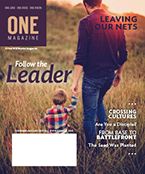
December-January 2016
Follow the Leader
------------------
|






Are You Building Battleships to Carry the Conversation?
By Ron Hunter
In recent months, decisions made by the Supreme Court have stimulated numerous conversations. Many Christians have talked gloom and doom, but when the government attempts to overturn biblical values, the Church has the opportunity to become more instrumental in shaping culture. The change to the definition of marriage has become the center of much dialogue.
These conversations are actually healthy because people are grappling with the theology and ethics surrounding various comparative ideals. Questions like, if two men or two women can legally marry, what about one
man and three women? How about a man and an
under-aged girl (or boy)?
These discussions prompt
people to suggest the need for boundaries. What is the source of boundaries? Is it popular opinion, personal choice, or is there a moral line to cross? If there is a moral or ethical line, what (or who) determines that line? Do questions like these help strengthen one’s position on this discussion or do they cause people to cave into societal or cultural pressure?
While pastors may find the banter and discussion of such topics routine, our kids (especially those in middle and high school and college) may not be equipped for this conversation. Why is this? Has the church or Sunday School not done an adequate job to prepare them? Have you talked with your kids about these topics (and not just a one-way conversation)? What can be done to prepare young adults and teens for encountering the culture? Who do our kids look to for their beliefs and morality?
Parents, kids have been watching, learning from, and imitating you. Go back to their first steps—the first time your son or daughter pulled up on the side of the couch, turned toward the middle of the room, and let go to walk: one step, then two, a bit of a wobble, and then plop, fall. Your little one looked up from this crumpled position to see your reaction—what you did, what you said, and how you looked—to interpret the moment. If you seemed scared or upset, the crying commenced. If you cheered or clapped, the laughing began. Through the developmental years and into adolescence, your child interpreted the world through your reactions.
Research has shown the top spiritual influencers of teens today are (in this order) mom, dad, pastor, grandparent, Sunday School, youth group, and church camp. Traditionally, parents teach their kids more than anyone else from the earliest stages—how to eat, how to distinguish colors and numbers, and how to pronounce words. Even when you think they are not paying attention, children and teens take their most important cues from parents’ views on topics such as finances, authority, relationships, politics, ethics, and God. Often, a child unknowingly adopts and accepts as truth the way his or her parents view the world and, as such, adopts their worldview.
How does one build a worldview?
Suppositions are the introduction of new values, ideas, knowledge, or moral dilemmas. An example of what our kids face as a new supposition is evolution instead of creation. Other suppositional challenges include the notion that Christian beliefs are non-scientific and anti-education. Presuppositions are the suppositions previously adopted. Holding to the authority of Scripture,
God as the source of Truth, and a biblical set of ethics for the treatment of humanity are all examples of presuppositions we want established in our kids (and adults). Simply stated, one has to evaluate a new supposition on the basis of what he or she already has adopted as correct. The lifetime accumulation of presuppositions creates a worldview. A worldview allows individuals to make decisions without conscious deliberation and, as such, determines values.
We need to build our kids’ worldviews like battleships. Provide them with ammunition and armor to defend truth. Bible memorization is a good start, but we need to help them connect the dots of how Scripture helps make decisions about everyday life issues. Keep each member of the family in a weekly Bible study, which could be a systematic and planned set of studies found in LifeGroups, Sunday School, or small groups. The classes, all ages on their level, need to learn apologetics (how to defend their faith). Most of all, teach and equip parents and grandparents how to reinforce Scripture-guided life decisions with their kids and grandkids. Each generation, and person, will adopt a worldview.
A worldview helps you arrive at solid decision-making and faith development or results in poor judgment and actions. The difference in cultivating solid values or bad behaviors is your starting point. If your starting point is flawed, your ending point will be flawed as well. If you are not developing a deeper and daily walk in Scripture but relying only on what happens at church, it is impossible to “own your faith” for daily use. True discipleship is not a part-time discipline. True discipleship cultivates a healthy biblical worldview.
Every person has a worldview even if he or she does not realize it. Worldviews are not fixed; they are constantly in development. It took a lot of time to accumulate your presuppositions to form your worldview, and it will likewise take work to shift the weight of one’s thinking in order to reshape a worldview. The most effective way to shape worldviews is for church and home to work together to reinforce what is taught in both settings.
The order of influence we should shoot for with church and home is theology, biblical worldview, philosophy (ethics), and then actions. You can see how each step of the sequence builds on the previous, and the foundation always comes back to theology (founded upon Scripture) as our guide for life. Sadly, today, society has flipped the primary order of influence to begin with actions. This occurs when culture cries out for tolerance, acceptance, and suggests people embrace unbiblical truth as the new norm. The flipped sequence is actions, philosophy (ethics), flawed worldview, and theology. We have a flawed starting point. No wonder society’s theology is lacking when we are not building strong biblical worldviews.
Who will have more influence in shifting the worldview of children and teens? That’s right—still the parents. So back to our question at hand: can the parents in our churches carry the weight of such conversations? Only parents with strong biblical worldviews can consistently help their kids successfully grapple with tough topics with the grace of Christ’s heart to reach people. If parents’ worldviews have the strongest influence, why are we not spending more time helping moms and dads (and grandparents) further develop not just a worldview, but a biblical worldview? The Supreme Court decision gives us a renewed reason to equip parents for these significant conversations. You can only talk passionately about what you passionately believe. Scriptural dialogue comes when the church equips parents to coach their kids.
America calls its military a defense system. Developing a strong biblical worldview is building kids like battleships. You want them to sail the vast ocean of life, not looking for a fight, but being more than capable to defend their theological foundations. Let’s help our kids launch into life sailing with strength alongside others in the fleet, fully capable to carry the difficult conversation because their parents armed them well.
About the Writer: Ron Hunter is CEO of Randall House. He was recently published in two books: The DNA of D6 and Youth Ministry in the 21st Century: Five Views (Youth, Family, and Culture). Both volumes are available at randallhouse.com.
|
|

